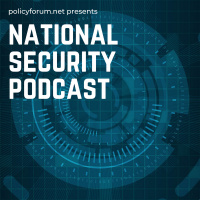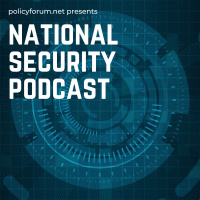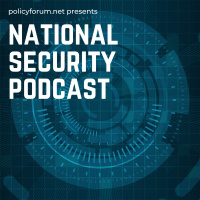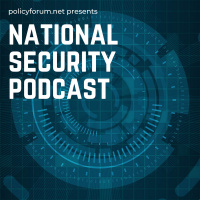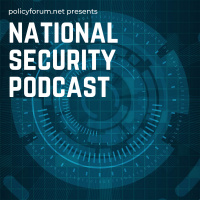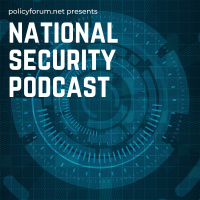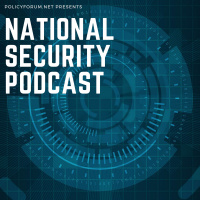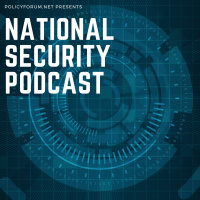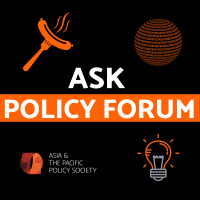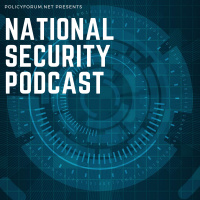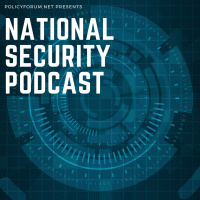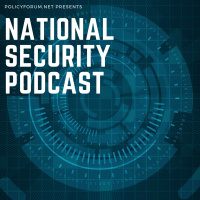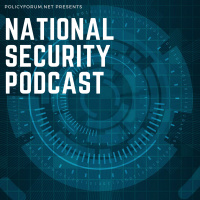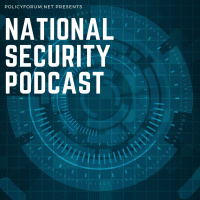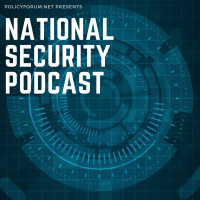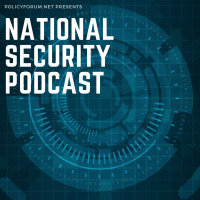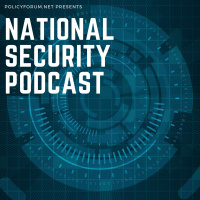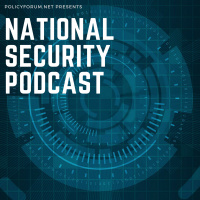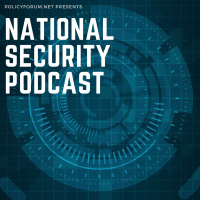Sinopsis
Chris Farnham and Katherine Mansted bring you expert analysis, insights and opinion on Australia and the region's national security challenges in this pod from Policy Forum. Produced with the support of the ANU National Security College.
Episodios
-
Foreign Minister Marise Payne on Australia and COVID-19
17/06/2020 Duración: 47minOn 16 June, Australian Foreign Minister Marise Payne delivered a policy address to the National Security College on Australia and the world in the time of COVID-19. Her remarks, and the following discussion of Australia's future in the region, make up this special episode of National Security Podcast.Is China using the COVID-19 crisis as a reason to spread disinformation about Australia, and how can international institutions, such as the World Health Organization, be safeguarded so that they can do their work without outside interference? In this episode, we host the foreign minister's speech on Australia's place in the world and COVID-19 and her discussion with Professor Rory Medcalf, Head of the National Security College. Senator the Hon Marise Payne is Minister for Foreign Affairs and Minister for Women in the Commonwealth Government. A Senator for New South Wales since 1997, she has more than two decades’ parliamentary experience including 12 years’ membership of the Joint Standing Committ
-
Foreign investment and national security
10/06/2020 Duración: 35minIn this episode of National Security Podcast, we speak with the Perth USAsia Centre's Dr Jeffrey Wilson about Australia's new investment measures and a shift toward caution in the face of foreign purchasing power.In recent years, many developed economies have been enhancing their foreign investment laws with a heightened focus on national security. On Friday 5 June, Australia announced that it would be following suit, introducing new screening measures to ensure foreign nationals and organisations would not endanger Australia by buying controlling stakes in sensitive areas of the economy. But what is driving this shift in the way countries view foreign investment, and why has Australia chosen now to readjust the way it understands its vulnerabilities and risks?Dr Jeffrey Wilson is Research Director at the Perth USAsia Centre. He provides leadership and strategic direction in developing the Centre’s research program across its publications, policy and dialogue activities. Jeffrey specialises in the region
-
Indonesia and COVID-19
03/06/2020 Duración: 59minOn this special episode of the National Security Podcast, we speak to three leading Indonesia experts about the impact of the coronavirus pandemic on the country's national security.How has Indonesia been impacted by COVID-19 and what are the implications for its national security? Has the pandemic offered terrorist organisations opportunities or new challenges? How will this health crisis influence the increased intensity of the conflict in West Papua? And how will the spread of the virus, which first emerged in China, impact the Chinese diaspora in Indonesia? In this episode of National Security Podcast we speak to Sidney Jones, Dr Quinton Temby, and Dr Charlotte Setijadi about the implications of COVID-19 for Indonesia’s national security. This episode is an edited version of a live podcast that was recorded on 21 May 2020. Sidney Jones is the Director of the Institute for Policy Analysis of Conflict. She has previously held leadership roles at the International Crisis Group and worked with the F
-
American national security and the 2020 election
15/05/2020 Duración: 45minIn this National Security Podcast, we speak to Professor Tom Nichols about international and domestic national security influences on the United States' 2020 elections. As the United States moves toward an election in the midst of a pandemic and increasing tensions with China, and in the shadow of Russian interference, national security is going to be central to its 2020 presidential and congressional elections. Should we expect more Russian interference and could they be successful a second time? Can America’s alliance network survive a second term of President Trump? Why are there armed civilians raiding state capitals, and what does this mean for domestic security? And what would happen if President Trump refused to accept the result of an election that ended his time in office? We tackle these questions and more in this National Security Podcast.Tom Nichols is Professor of National Security Affairs at the US Naval War College, an Adjunct Professor at the Harvard Extension School, a former a
-
Policy challenges of responding to climate change and COVID-19
15/04/2020 Duración: 01h08minIn this episode, we talk to the former head of Emergency Management Australia Mark Crosweller about national resilience in an era of climate change and COVID-19.How has Australia’s recent bushfire disaster impacted the way policymakers consider climate change and its impact on national security? Has COVID-19 illuminated the fragility of an interdependent society? What is it that keeps a former Director General of Emergency Management Australia awake at night? In this National Security Podcast, Mark Crosweller talks about our vulnerability to the increased severity of climate change-driven natural disasters, the impacts of national crises like COVID-19, and how we need to change the way we look at developing national resilience in the face of a dangerous future.Mark Crosweller was the Director General of Emergency Management Australia and led the National Resilience Taskforce for the Commonwealth Government of Australia. Mark’s professional life has seen him serve in leadership roles for state and territory, a
-
Disinformation - from climate change to COVID-19
02/04/2020 Duración: 49minHow do Australia’s experiences fit into the global contest over the climate change narrative and why is that contest now bleeding into discussion about the coronavirus pandemic? On this National Security Podcast, Chris Farnham is joined by Chris Zappone to tackle a growing spread of disinformation in the media and how it can affect a crisis.Australia’s recent bushfire crisis saw the nation’s computer screens, airwaves, and television screens dragged into the global disinformation storm over climate change. Who were the actors behind messages and memes claiming that the fires were the work of arsonists or climate change activists, and what were their aims? In this podcast we speak to Chris Zappone, Digital Foreign Editor for The Age and TheSydney Morning Herald to determine the answer to this and more on disinformation, from climate change to COVID-19.Chris Zappone is Digital Foreign Editor at The Age and Sydney Morning Herald, where his writing focuses on the interplay between technol
-
The implications of climate change for national security
17/03/2020 Duración: 40minHow do the impacts of climate change make it a national security issue, and how is climate change going to affect Australia’s preparedness for national resilience and even war? In this episode of the National Security Podcast, Chris Farnham speaks with Associate Professor Matt McDonald about where major risks likely lie for national defence, societal resilience, and regional security in the face of the climate crisis.Associate Professor Matt McDonald is Reader in International Relations at the School of Political Science and International Studies of the University of Queensland. His research focuses on critical theoretical approaches to security and their application to environmental change, Australian security policy, climate politics, and security dynamics in Asia and the Pacific.Chris Farnham is the presenter of the National Security Podcast. He joined the National Security College in June 2015 and is currently Senior Outreach and Policy Officer. His career focus has been on geopolitics
-
Rory Medcalf on the contest for the Indo-Pacific
05/03/2020 Duración: 57minOn this episode, Chris Farnham chats with Professor Rory Medcalf about the future of the Indo-Pacific region and Australia's place in it.Will any one country have the power to map the future of a region so central to global prosperity and security? If diplomacy fails, the Indo-Pacific will be the theatre of the first general war since 1945. But if its future can be secured, the Indo-Pacific will flourish as a shared space. In this episode of the National Security Podcast, Chris Farnham speaks to Rory Medcalf about his new book, Contest for the Indo-Pacific: why China won’t map the future and Australia’s place in a multipolar region.Rory Medcalf is the head of the National Security College at The Australian National University. His professional background involves more than two decades of experience across diplomacy, intelligence analysis, think tanks, and journalism.Chris Farnham is the presenter of the National Security Podcast. He joined the National Security College in June 2015 an
-
Ask Policy Forum: The podcast where you ask the questions
20/02/2020 Duración: 01h01minJoin us at the pod squad members’ lounge as we field your questions on all sorts of issues, from how countries are performing on emissions reduction to which politician you’d least like to be stuck in conversation with at the annual Midwinter Ball.On the first episode of our special Ask Policy Forum series, regular hosts and special guests crack a beverage and chat about what you want to know. Led by Chris Farnham of the National Security Podcast, kick back as Mark Kenny of Democracy Sausage, Martyn Pearce of Policy Forum Pod, Professor Mark Howden, Associate Professor Carolyn Hendriks and Dr Arnagretta Hunter field your questions on life, the universe and everything.Future episodes of Ask Policy Forum will be released only to members of our Policy Forum Pod Facebook group, so make sure you jump online and join to get access to this exclusive monthly pod.Mark Howden is Director of the ANU Climate Change Institute. Mark was a major contributor to the Intergovernmental Panel on Climate Change reports for t
-
Populism and Australia’s future in Asia
12/02/2020 Duración: 55minIn this episode of National Security Podcast, Sam Roggeveen joins Chris Farnham and Katherine Mansted to talk about his recent paper Our Very Own Brexit: Australia’s Hollow Politics and Where It Could Lead Us.Is Australia seeing a surge in conservative sentiment, or is the nation being led by political parties in search of a new identity? On this National Security Podcast, we are joined by Sam Roggeveen of the Lowy Institute to discuss where and how domestic politics and foreign policy interact, and ask what it would mean for Australia’s place in Asia if the country’s politics were to turn on multiculturalism.Sam Roggeveen is Director of the Lowy Institute’s International Security Program and a Visiting Fellow at The Australian National University's Strategic and Defence Studies Centre.Katherine Mansted is a senior adviser at the National Security College and non-resident fellow at the Harvard Kennedy School’s Belfer Center for Science and International Affairs. Previously, she was a commercial soli
-
Freedom of the press and the year that was 2019
10/12/2019 Duración: 42minIs press freedom a national security issue? If it is, what does that mean for Australia’s regional relations and its fight against foreign interference? In this episode of the National Security Podcast, Katherine Mansted and Rory Medcalf discuss their recent submission to the Parliamentary Joint Committee on Intelligence and National Security on freedom of the press. They also unpack pivotal national security issues for the region in the past year and discuss what policymakers should keep an eye out for in 2020.Rory Medcalf is the head of the National Security College at The Australian National University. His professional background involves more than two decades of experience across diplomacy, intelligence analysis, think tanks and journalism.Katherine Mansted is a Senior Adviser for Public Policy at the National Security College and a Non-resident Fellow at the Harvard Kennedy School’s Belfer Center for Science and International Affairs.Chris Farnham is the presenter of the National Security Podcast. He j
-
Impeachment, foreign policy, and national security
03/12/2019 Duración: 57minIn this National Security Podcast, Dr Charles Edel and Dr Gorana Grgic discuss the details of the new United States Studies Centre report, Impeachment: The insider’s guide. Dr Edel explains the origins of the impeachment process and how it works, and when it was designed to be applied. Dr Grgic takes us through President Trump's peculiar brand of foreign policy-making, what it means for states in Eastern Europe facing Russian aggression, and how it came to be that Rudi Giuliani was able to run his own parallel and unaccountable US foreign policy in Ukraine. Finally, we ask what this all means for America’s allies and security partners in the Indo-Pacific and beyond.Charles Edel is Senior Fellow and Visiting Scholar at the United States Studies Centre at the University of Sydney. Prior to this appointment, he was Associate Professor of Strategy and Policy at the US Naval War College and served on the US Secretary of State’s Policy Planning Staff from 2015-2017.Gorana Grgic is a jointly appointed Lecturer at th
-
Women in National Security: Hon Mariya Didi, Minister of Defence of the Republic of Maldives
27/11/2019 Duración: 26minIn this National Security Podcast, Defence Minister Mariya Didi explains what drives the Maldives to look to its democratic neighbours, India and Sri Lanka, as the nation’s security partners and most important relationships. She talks of the impact of climate change on the island nation and tells us what it is like to live on and make policy for islands whose highest elevation is less than 5 metres above sea level as oceans rise. In a very candid and personal way, Minister Didi also details the struggle for democracy in the Maldives. She reflects on her experience of being ousted by the country’s security forces, only to return to government and command those very same forces as their Defence Minister. Minister Didi also provides insight into her leadership style, the pathway to reconciliation, and the sources of her personal courage and motivation.Mariya Didi is the current Minister for Defence of the Republic of Maldives, a former Member of Parliament and a leading human rights activist in the country.Chris
-
Techlosophy and the future of security
06/11/2019 Duración: 46minIn this National Security Podcast, Zac Rogers and Katherine Mansted talk about why political leaders have long been attracted to the idea that technology is a revolutionary key to progress and power. They also discusses how ideas about technology and modernity have animated brutal political regimes, global business models, and ideologies – from Leninism to Maoism. From China’s emerging brand of 'techno-authoritarianism' to the 'technological nihilism' of some Silicon Valley companies, we ask how emerging technologies are shaping politics, power, and security.Hugely powerful digital corporations shape our daily preferences and behaviours, and potentially even our brains. Is the digital revolution on track to be an 'organ transplant the body rejects'? How can governments tame technology to serve their interests and values? And what would a whole-of-society conversation about digital democracy look like?Zac Rogers is Research Lead at the newly-established Jeff Bleich Centre for the US Alliance in Digital Technol
-
Right-wing extremism and domestic terror (part two)
22/10/2019 Duración: 42minIn this National Security Podcast, Nicholas Rasmussen, former director of national counter-terrorism in the United States, and Jacinta Carroll, Australian policy professional in countering violent extremism, join Chris Farnham to talk about how current policy is hampering a whole-of-government response to domestic terrorism. The panel discuss how extremism policy differs from country to country, the role of politicians, and the tech sector's responsibility to recognise the difference between freedom of expression and the encouragement of violence.Jacinta Carroll is the Director of National Security Policy at the ANU National Security College. She was previously the inaugural head of ASPI’s Counter-Terrorism Policy Centre.Nicholas Rasmussen is a national security expert with over 27 years in US government service. He is Vice-Chancellor’s Distinguished Visiting Fellow at The Australian National University, former Director of the US National Counterterrorism Center, and current Senior Director of the McCain Inst
-
Right-wing extremism and domestic terrorism (part one)
02/10/2019 Duración: 01h01minWhat poses the greatest risk, Islamic terrorism or far-right extremism?First exploring whether right-wing extremism is a new challenge and why conspiracy theories seem to have such great influence with the ‘alt-right’ and ultra-nationalists, the panel ask if there is a counter-balance to the threat of right-wing extremism.In the second pod of the series Nick Rasmussen, the former head of US national counter-terrorism, and terrorism expert Jacinta Carroll will talk policy options to deal with this challenge.Alex Mann is a Sydney-based broadcast journalist with the ABC's flagship investigative podcast, Background Briefing. In 2017, he was recognised as South Australia’s Journalist of the Year and has won several other media awards for his reporting.Kristy Campion is a lecturer in terrorism studies at Charles Sturt University, with special focus on the history of terrorism and right-wing extremism. She holds first-class honours in terrorism history and a PhD on the same topic.Chris Farnham is the presenter of th
-
Fintech and the geopolitics of crypto-currencies
04/09/2019 Duración: 34minAs Facebook advances its plan for a new cryptocurrency – Libra – we ask what the fintech revolution means for national security. Will a major player like Facebook take crypto mainstream, and if so, how could that reshape global financial flows and economic power? In this National Security Podcast, Katherine Mansted explores what is shaping the cryptocurrency landscape - from the invisible creators of Bitcoin, to nation-states with a penchant for fintech innovation. We discuss the opportunities and pitfalls of Facebook’s proposed new cryptocurrency, Libra, as well as the other crypto actors on the scene. Chris Zappone is Digital Foreign Editor at The Age and Sydney Morning Herald, where his writing focuses on the interplay between technology, politics, economics, and the future. Elise Thomas is a Researcher working with ASPI’s International Cyber Policy Centre. She has previously worked as a freelance journalist, including writing for Wired, Guardian Australia, SBS, Crikey and The Interpreter. Katherine Manste
-
In the middle of the Indo-Pacific: Japan, Southeast Asia and Pacific Islands
15/08/2019 Duración: 01h16minToo often, discussion of the 'Indo-Pacific' is heavily focused on China, the United States and India. While these nations are the biggest actors in the region, it is important to note that they are not the only nations with influence. As security policy evolves, we ask how other nations, from big economies such as Japan and Indonesia, to smaller states like Papua New Guinea and Vanuatu, are internalising the concept and incorporating it into national strategy. In this week's episode, Chris Farnham goes in depth on national strategies in the Indo-Pacific region. Chatting Southeast Asia with Greta Nabbs Keller, the Pacific islands with Joanne Wallis, and then turning to Hiroyasu Akutsu for a discussion on Japan, this National Security Podcast offers insight into the shifting sands of the regions' policies. Hiroyasu Akutsu is a Senior Fellow and Professor at the National Institute for Defense Studies in Tokyo. He specializes in political and military issues on the Korean Peninsula and Northeast Asia, Japan-Austr
-
Identity, geopolitics, and Europe’s place in the new world order
24/07/2019 Duración: 50minAs technology alters the constraints that geography poses on nations, societies, and individuals, how will national security change? How will the fragmentation of society along lines of proximity, ethnicities, and belief systems evolve in an increasingly networked world? Is Brexit the beginning of disintegration for Europe, can Russia ever be brought in from the cold, and what role, if any, does the EU have to play in the tensions between the US and China? In this National Security Podcast, Chris Farnham talks to Jean-Marie Guéhenno, the author of The Fog of Peace, on how nations will evolve and what that means for national – or even city-based – security. In a networked world of fragmenting societies, the impact of technology and the balkanisation of the tech sector will change how we relate to each other and how we identify, collectivise, and defend ourselves. We also discuss the ‘what now’ for Europe in the face of a disruptive Russia, and whether the two will ever find common ground. Jean-Marie Guéhenno i
-
Kelly Magsamen on US National Security Policy
11/07/2019 Duración: 41minIn this episode of the National Security Podcast we talk to Kelly Magsamen about American national security policy - what is driving it, where it is going, and if we’re headed into a cul-de-sac of policy failure. We also find out if the Obama administration moved too slowly to counter China’s militarisation of the South China Sea or whether it was a mistake by Beijing to even build bases amongst its Southeast Asian neighbours. And we ask considering the global rules-based order, why should we care anymore and did it ever even matter? Kelly Magsamen is the vice president for National Security and International Policy at the Center for American Progress. Prior to joining American Progress, she served in various national security positions. Magsamen was the principal deputy assistant secretary of defense for Asian and Pacific Security Affairs and performed the duties of assistant secretary of defense. In these positions, she was a lead adviser to the secretary of defense for U.S. defense policy and strategy acro

